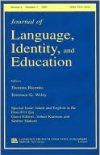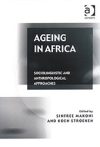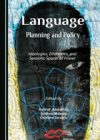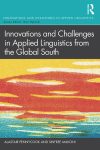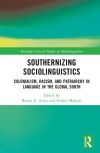Sinfree Makoni

Education
Professional Bio
Sinfree Makoni was born in Zimbabwe. He holds a BA in English (Hons) with a specialty in Linguistics from the University of Ghana, Legon, Accra, and a PhD in Applied Linguistics from Edinburgh University, Scotland. He taught at several universities in southern Africa, notably the University of the Western Cape, Bellville, and University of Cape Town. He was a postdoctoral Fellow at the Centre for Afro-American Studies at the University of Michigan. He is currently a Professor in the Department of Applied Linguistics and Director of the African Studies Program at Pennsylvania State University, Extraordinary Professor at University of the Western Cape and North-West University, and a Visiting Professor at Nelson Mandela University. He was a Carnegie Diaspora Fellow at Laikipia University, Kenya. He has published extensively in the areas of Language and Aging, Language and Security, Language Policy and Planning, Southern Epistemologies, and Decoloniality. His most recent publications include Innovations and Challenges to Applied Linguistics from the Global South (co-authored with A. Pennycook; London and New York: Routledge Press, 2020); Integrational Linguistics and Philosophy of Language in the Global South (S. Makoni, D. Verity, & A. Kaiper-Marquez, eds.; London and New York: Routledge Press, 2021); The Languaging of Higher Education in the Global South: De-Colonizing the Language of Scholarship and Pedagogy (S. Makoni, C. Severo, A. Abdelhay & A. Kapier-Marquez, eds.; London and New York: Routledge Press, 2022); Language in the Global Souths S. Makoni, A., Kaiper-Marquez, & L. Mokwena, eds., London and New York: Routledge Press, 2022); and Decolonial Voices, Language and Race (S. Makoni, M. Madany-Saa, B. Antia, & R. Gomez, eds., Bristol, UK: Multilingual Matters, 2022). He is the architect of the African Studies Global Forum, which seeks to engage scholars in both the Global North and Global South, and the co-editor of the new Multilingual Matters book series Global Forum on Southern Epistemologies. He currently serves as Associate editor of Applied Linguistics.
Select Recent Articles and Book Chapters
Makoni, S. B. (2014). Plural formations of literacy and Occam’s razor principle. In K. Juffermans, Y. Mesfun, & A. Abdelhay (Eds.), African literacies: Ideologies, scripts, education (pp. 399-365). Cambridge: Cambridge University Press.
Makoni, S. B., & Severo, C. G. (2014). Lusitanization and Bakhtinian perspectives on the role of Portuguese in Angola and East Timor. Journal of Multilingual and Multicultural Development[published online April 2014]
Severo, C. G., & Makoni, S. B. (2014). Discourses of language in colonial and postcolonialBrazil. Language and Communication, 34, 95-104.
Makoni,S. B. (2013). Discourses of terror: The US from the view point of the ‘other’. Applied Linguistics Review, 4, 23-42.
Makoni, S. B. (2013). An integrationist perspective on colonial linguistics. Journal of Language Sciences, 35, 87-96.
Makoni, S. (2011). A critical analysis of the historical and contemporary status of minority languages in Zimbabwe. Current Issues in Language Planning, 12, 437-455.
Makoni, S. (2011). Language and human rights discourses: Lessons from the African experience. Journal of Multicultural Discourses, 1-20.
Makoni, S. (2011). Sociolinguistics, colonial and postcolonial: An integrationist perspective.Language Sciences, 33, 680-688.
Makoni, S., & Makoni, B. (2011). The discursive construction of the female body in family planning pamphlets. In V. Ramanathan & P. McPherron (Eds.), Language, bodies, and health (pp. 193-221). New York: De Gruyter Mouton.
Makoni, S., & Pennycook, A. (2011). From monolingualism to multilingualism and back again. In M. Martin-Jones, A. Blackledge & A. Cleese (Eds.), The Routledge handbook of multilingualism (pp. 439-452). London: Routledge.
Abdelhay, A., Makoni, B., & Makoni, S. (2011). The Naivsha language policy: The language of politics and the politics of language in the Sudan. Language Policy, 10, 1-18.
Makoni, B., Makoni, S., & Pfukwa, C. (2010). Language planning, language ideology, and entextualization: War naming practices. Names: A Journal of Onomastics, 12, 197-208.
Makoni, S., Makoni, B., & Rosenberg, A. (2010). The wordy worlds of popular music in Eastern and Southern Africa: Possible implications for language-in-education-policy. Journal of Language, Identity, and Education, 9, 1-16.
Makoni, S., & Dube, B. (2009). English and education in Anglophone Africa: Historical and current realities. In M. S. Wong & S. Canagarajah (Eds.), Christian and critical English language educators in dialogue: Pedagogical and ethical dilemmas (pp. 106-120). New York: Routledge.
Makoni, B., Makoni, S., & Nyika, N. (2009). Language planning from below: The case of the Tonga in Zimbabwe. Current Issues in Language Planning, 9, 413-439.
Makoni, S. (2008). Aging in Africa: A critical review. Journal of Cross-Cultural Gerontology,23, 199-209.
Makoni, S., & Makoni, B. (2007). “I Am Starving With No Hope To Survive”: Southern African perspectives on pedagogies of globalization. International Multilingual Research Journal, 1, 105-109.
Ramanathan, V., & Makoni, S. (2007). Bringing the body back: The (mis)languaging of bodies in bio-medical, societal and poststructuralist discourses on diabetes and epilepsy. Critical Inquiry in Language Studies, 4, 283-306.
Makoni, S., Brutt-Griffler, J., & Mashiri, P. (2007). The use of 'indigenous' and urban vernaculars in Zimbabwe. Language in Society, 36, 25-49.
Makoni, B., Makoni, S., & Mashiri, P. (2007). Naming practices and language planning in Zimbabwe. Current Issues in Language Planning, 8, 437-467.
Giles, H., Dailey, R. M., Sarkar, J. M., & Makoni, S. (2007). Intergenerational communication beliefs across the lifespan: Comparative data from India. Communication Reports, 20, 75-89.
Makoni, S., Dube, B., & Mashiri, P. (2006). Zimbabwe colonial and post-colonial language policy and planning practices. Current Issues in Language Planning, 7, 377-414.
Hajek, C., Barker, V., Giles, H., Makoni, S., Pechunni, L., Louw-Poutgieter, J., Meyer, P. (2006). Communicative dynamics of police-civil encounters: American and African data.Journal of Intercultural Communication Research, 35, 161-182.


